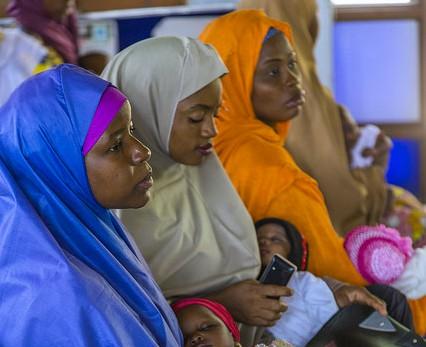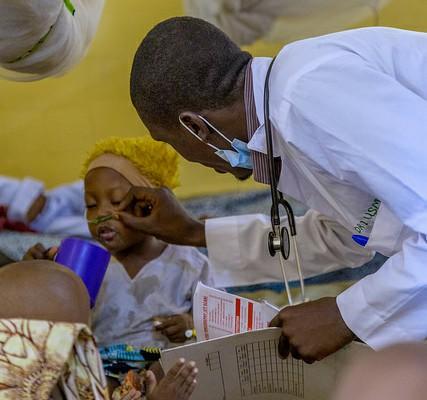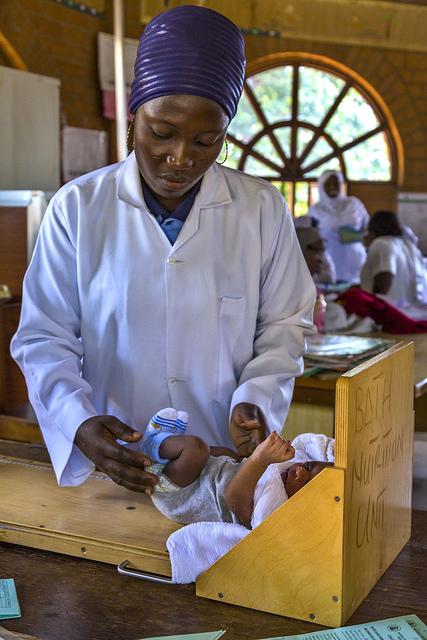[SUCCESS STORY] Partnerships to Improve Primary Health Services
Download PERL Success Story in PDF
 |
Health care, if tackled at the primary level, will respond to the majority of health challenges affecting citizens. Kaduna State, through sustained partnerships, is engaging to reform its health delivery systems. It is doing this by linking services to core governance functions of resource allocation.
Facts and figures aside, the names and faces of her patients are what Hajia Zainab Umar recalls from her time, working as a midwife. For her, “the joy of midwifery was in assisting a woman through pregnancy up to delivery and seeing both mother and baby alive after birth.” In her 20 years in the profession, Zainab, like other health care workers, has seen a devastating number of maternal and child deaths; this motivates her to continue working towards ending maternal and infant mortality.
Hajia Zainab Umar alongside Dorcas Adeyemi and Mustapha Jumare, are at the forefront of the Kaduna State Maternal Accountability Mechanism (KADMAM), a Civil Society Organisation (CSOs), which focuses on maternal and child mortality. KADMAN was one of the CSOs supported by the Department for International Development (DFID) governance programmes State Accountability and Voice Initiative (SAVI) and State Partnership for Accountability, Responsiveness and Capability (SPARC). At the close out of these programmes, the DFID Maternal, Newborn and Child Health (MNCH2) Programme, consolidated support to the civil society coalition.
"We met brick walls everywhere and nobody really wanted to listen.” Hajia Zainab Umar
KADMAM is a member of the civil society advocacy partnership on health that was established by MNCH2 and since 2016, supported by the Partnership to Engage, Reform and Learn (PERL). Prior to engaging through coalitions, spaces for citizens involvement in governance processes were limited. The approach of PERL and its predecessor programmes to strengthen capability and through established partnerships facilitating engagement between state and non-state actors around reform and service delivery issues, has been useful in opening spaces for actors to co-create solutions to service delivery challenges. In 2014, the Open Kaduna for Health platform was set up to provide a lasting mechanism to facilitate engagement between government and citizens around health issues.
"The opportunity provided during the public hearing for civil society to make contribution into this bill would have been bungled if PERL had not helped us understand the bill and prepare our inputs and presentations,” said Mustapha Jumare, Open Kaduna Co-Chair
 |
Opportunities for the coalition grew, as the current administration assumed office with a clear agenda to strengthen primary health care systems. In response, the “Primary Healthcare Under One Roof” (PHUOR) Bill was proposed to address the fragmentation across the sector and bring all primary healthcare services under one authority. The administration also championed open governance and maintained the Open Kaduna platform as a mechanism to engage non-state actors around health issues.
"We knew that before taking your case to policy makers, you should clearly understand the issues and be ready to defend them.” says Mustapha Jumare, Open Kaduna Co-Chair.
The PERL programme is also contributing to enhancing the organisational capability of the State Primary Healthcare Development Agency (SPHCDA), to coordinate primary healthcare activities across the state by clarifying its mandate and objectives. By making its objectives more focused, the agency is creating systems and processes as well as setting service standards that drive the removal of blockages to advance the delivery of healthcare services in communities. The agency is also evaluating its financial and human resource management structures to maximize available resources at its disposal.
Through a stronger citizens’ accountability mechanism, the coalition periodically tracks health budget releases in the state and is monitoring the ongoing renovation and upgrade of the Primary Health Care centres across the state. To date, 124 primary health care centres have been renovated, while 3,059 new health workers recruited.
 |
"We are not just upgrading our PHCs and increasing routine immunization, we know the number of personnel needed to run each centre efficiently, we measure standards of service and civil society groups are monitoring to give us feedback, so that we can continue improving.” Awwal Waziri, Director Planning, Research and Statistics, SPHCDA
According to Abubakar Shehu Galadima, Secretary to the State House of Assembly Committee on Health and Human Services, the journey to continue this process was possible through constant engagement between the legislature, the executive and civil society and “we are more than ready to sustain this progress,” he says. The partnership on health in Kaduna State has been a key success factor in the engagement and reform initiatives in the health sector. As a result, confidence in the primary health systems is improving and better services are being delivered. According to Hajia Zainab Umar, getting women to hospitals was challenging; they need permission from their husbands, roads are bad and the health facilities were in poor shape, but now “mothers are coming!” she says.
Partners providing technical and financial support to the Kaduna State Government and Civil Society coalition include:
- USAID - Strengthening Advocacy for Civic Engagement;
- (SACE) DFID - Partnership to Engage, Reform and Learn Programme;
- DFID - Maternal, Newborn and Child Health (MNCH2);
- Health Reform Foundation of Nigeria (HERFON);
- Family Health Advocacy in Nigeria Initiative (FHANI);
- Health Strategy and Delivery Foundation (HSDF);
- Pamela Steel Associates of the Bill & Melinda Gates Foundation (BMGF).